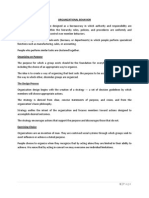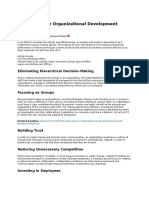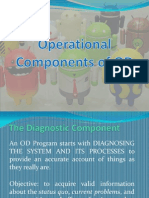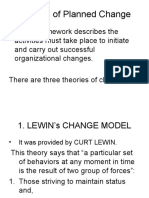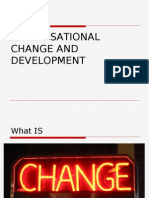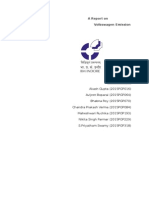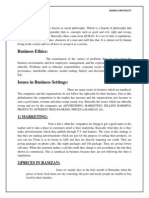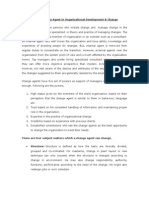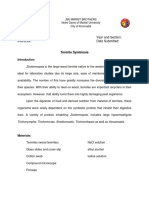Organisational Change and Development
Uploaded by
avijeetboparaiOrganisational Change and Development
Uploaded by
avijeetboparaiORGANISATIONAL CHANGE AND DEVELOPMENT
What is Change?
Change is a shift in the externals of any situation, for example, setting up a new program, restructuring a business, moving to new location, or a promotion.
Reasons for Change
Nature of the workforce Technology Economic shocks Competition Social trends World politics
Forms of Change
Planned Change
Change resulting from a deliberate decision to alter the organization Activities that are intentional and goal oriented
Goals of Planned Change
Improving the ability of the organization to adapt to changes in its environment Changing the behavior of individuals and groups in the organization
Unplanned Change
Change imposed on the organization and often unforeseen
Resistance to Change
Fear of Unknown Fear of Loss Fear of Failure Disruption of Interpersonal Relationship
Personality Conflicts
Politics Cultural Assumptions and Values
Sources of Resistance to Change
Individual Resistance Habit Security Economic Factors Fear of the Unknown Selective Information Processing Organizational Resistance Limited Focus of Change Group Inertia Threat to Expertise Threat to Established Power Relationships Threat to Established Resource Allocations
Overcoming Resistance to Change
Tactics for dealing with resistance to change:
Education and communication Participation
Facilitation and support
Negotiation Manipulation and cooptation Selecting people who accept change
Organizational Development (OD)
Collection of planned interventions, built on humanisticdemocratic values, that seeks to improve organizational effectiveness and employee well-being Planned effort initiated by process specialists to help an organization develop its diagnostic skills, coping capabilities, linkage strategies and a culture of mutuality OD Values
Respect for people Trust and support
Power equalization
Confrontation Participation
Objectives of OD Programme
Individual and group development Development of organization culture and processes by constant interaction between members irrespective of levels of hierarchy Inculcating team spirit Empowerment of social side of employees Focus on value development Employee participation, problem-solving and decision-making at various levels Evaluate present systems and introduction of new systems thereby achieving total system change if required Transformation and achievement of competitive edge of the organization Achieve organization growth by total human inputs by way of research and development, innovations, creativity and exploiting human talent Behavior modification and self managed team as the basic unit of an organization
Important Aspects of OD
Long-term effort Led and supported by top management Visioning processes-viable, coherent and shared picture Learning processes Problem solving processes Ongoing collaborative management of the organizational culture Intact work teams and other configurations Cross- functional teams Consultant- facilitator role
Broad Categories of OD-Techniques
Behavior Focused Sensitivity Training Process Consultation Team Building Inter-group Development Structure Focused Survey Feedback Job Enlargement Job Enrichment Management by Objectives
THANK YOU
You might also like
- An Investment Perspective of Human Resource Management78% (9)An Investment Perspective of Human Resource Management31 pages
- Definition of Organization Development Organisation Development Is A System100% (1)Definition of Organization Development Organisation Development Is A System30 pages
- Chapter 13 - Organisational Change and Organisational DevelopmentNo ratings yetChapter 13 - Organisational Change and Organisational Development9 pages
- Section: Organization Development Unit - I - ANo ratings yetSection: Organization Development Unit - I - A31 pages
- Organisational Development and Change Assignment: Topic-OD Interventions Using Positive Model100% (1)Organisational Development and Change Assignment: Topic-OD Interventions Using Positive Model3 pages
- HRM, Ergonomics and Work Psychodynamics: A Model and A Research Agenda100% (1)HRM, Ergonomics and Work Psychodynamics: A Model and A Research Agenda8 pages
- A Theory of Organizational Readiness For ChangeNo ratings yetA Theory of Organizational Readiness For Change9 pages
- Emerging Socio Economic and Techno Economic Profile & Role of State in Managing IRNo ratings yetEmerging Socio Economic and Techno Economic Profile & Role of State in Managing IR28 pages
- Organizational Development: Foundation OD Process Intervention Techniques Ethics PoliticsNo ratings yetOrganizational Development: Foundation OD Process Intervention Techniques Ethics Politics25 pages
- Chapter-6 - Employee Involvement - Work DesignNo ratings yetChapter-6 - Employee Involvement - Work Design12 pages
- Values & Assumptions of Od & Ethics of Od Professionals100% (1)Values & Assumptions of Od & Ethics of Od Professionals26 pages
- Leadership Development Programs and Models: SyllabusNo ratings yetLeadership Development Programs and Models: Syllabus44 pages
- Eight Steps For Organizational Development InterventionsNo ratings yetEight Steps For Organizational Development Interventions6 pages
- Essay On Organisational Culture by Sander Kaus80% (5)Essay On Organisational Culture by Sander Kaus17 pages
- Organization Development and Change Thomas G. Cummings Christopher G. Worley Chapter Twenty Two - Transorganizational Change.No ratings yetOrganization Development and Change Thomas G. Cummings Christopher G. Worley Chapter Twenty Two - Transorganizational Change.12 pages
- The Influence of Decision Making in Organizational Leadership and Management Activities100% (1)The Influence of Decision Making in Organizational Leadership and Management Activities13 pages
- Notes - Managing Organizational Change - Updated - To Be Sent To StudentsNo ratings yetNotes - Managing Organizational Change - Updated - To Be Sent To Students14 pages
- Theoretical Framework of SHRM - Models of SHRM100% (2)Theoretical Framework of SHRM - Models of SHRM6 pages
- EXPLORING KEY FACTORS THAT INFLUENCE TALENT MANAGEMENTFrom EverandEXPLORING KEY FACTORS THAT INFLUENCE TALENT MANAGEMENTNo ratings yet
- ORGANISATION CHANGE AND DEVELOPMENT 1.1 [Autosaved]No ratings yetORGANISATION CHANGE AND DEVELOPMENT 1.1 [Autosaved]18 pages
- Management of Change and Organizational DevelopmentNo ratings yetManagement of Change and Organizational Development22 pages
- Ey Speeding Ahead On The Telecom and Digital Economy Highway 2No ratings yetEy Speeding Ahead On The Telecom and Digital Economy Highway 2116 pages
- Mission & Vision of The Firm Know Yourself: SWOT Analysis Scan External EnvironmentNo ratings yetMission & Vision of The Firm Know Yourself: SWOT Analysis Scan External Environment14 pages
- Mahindra Group Finance Crowdfunding StrategyNo ratings yetMahindra Group Finance Crowdfunding Strategy3 pages
- Jurnal - Faikar Muhammad - D 111 08 908 PDFNo ratings yetJurnal - Faikar Muhammad - D 111 08 908 PDF10 pages
- Replacing A Heavy Fuel Oil Boiler by A Biomass Boiler: Case StudyNo ratings yetReplacing A Heavy Fuel Oil Boiler by A Biomass Boiler: Case Study2 pages
- Citywide Action Plan For Upgrading Unplanned and Unserviced Settlements in Dar Es SalaamNo ratings yetCitywide Action Plan For Upgrading Unplanned and Unserviced Settlements in Dar Es Salaam78 pages
- DATA REPRESENTATION Computer Number SystemNo ratings yetDATA REPRESENTATION Computer Number System48 pages
- Role of Change Agent in Organizational Development & ChangeNo ratings yetRole of Change Agent in Organizational Development & Change4 pages
- Cst304 Computer Graphics and Image Processing, June 2023No ratings yetCst304 Computer Graphics and Image Processing, June 20233 pages
- Advertisement For Teaching Posts - 2016No ratings yetAdvertisement For Teaching Posts - 201610 pages
- The Release of TiO2 and SiO2 Nanoparticles From NanocompositesNo ratings yetThe Release of TiO2 and SiO2 Nanoparticles From Nanocomposites4 pages
- Nato Unclassified: Declassified/Declassifié - Public Disclosed/Mise en Lecture PubliqueNo ratings yetNato Unclassified: Declassified/Declassifié - Public Disclosed/Mise en Lecture Publique55 pages
- Ferestre Sky-Frame Installation DetailsNo ratings yetFerestre Sky-Frame Installation Details68 pages













